McDonagh’s Three Billboards is a tonal masterpiece
- harrypd21
- Mar 1, 2018
- 3 min read
Updated: Jun 28, 2019
Martin McDonagh’s Three Billboards Outside Ebbing, Missouri masterfully blends black comedy and drama within the framework of a crime film; though its narrative, one handled brilliantly by its trio of veteran actors, has much more to say about redemption and forgiveness than muder mystery. The Three Billboards in in question are those erected by Mildred Hayes (Frances McDormand in an potential Oscar shoe-in turn), challenging the local police department’s ineptitude over the murder of her daughter. An defiant act which turns the whole of the Ebbing community, family, workers, even bar patrons who associate with those involved, to essentially stand on one side of a divisive line drawn in the sand.
In many ways Three Billboards has the feel of a modern day Western, quite literally in the feud between Woody Harrleson’s Sheriff, or Chief, Willoughby and McDormand’s outlaw of sorts. The film is less about the conclusion of a murder investigation as it is about the nature of coping, forgiveness and potential redemption; however the conclusion of the movie may, deftly, considering it does too for its characters, leave you questioning the closure that’s been had in somewhat of a twist that highlights the real world reality that perhaps not everything is gon’ be alright.
McDonagh’s direction clearly draws the best from his leads: McDormand, the grief-stricken but stony-faced Mother; Harrleson, the Police Chief attempting to placate a town as well as his own force whilst struggling with his own demons; and Sam Rockwell in another career high as the drunk, violent and swaggering hard-ass cop who is essentially a good, feeling man with morals. Now, it is at this point that real-world consequences have been generated in criticising McDonagh for his insensitive or simplistic handling of Dixon, Rockwell’s character, as the racist cop who is too easily redeemed.
While the issue in question happens off-screen and it could be argued that from what we’re shown of Dixon’s home environment he appears fairly well adjusted, it’s just the fact that perhaps this additional trait to an already colourful and rounded character is unnecessary – it doesn’t really affect the film or Rockwell’s character arc in a significant enough way to be warranted in an otherwise tight film. Indeed, Dixon as a violent drunk alone is more intriguing. Having said that, it shouldn’t do much to harm Rockwell’s chances after a deserved BAFTA win, being more a directorial blunder.
“deftly side-roaded into moments of tender drama”
However, Three Billboards is clearly, but quietly, a vehicle for McDormand’s Hayes. McDormand plays, with perfectly weighted naturalistic grace, the familiar face of grief: putting one foot in front of the other, dealing with the day to day and ultimately investing herself violently for the sake of purpose into a cause that may well be hopeless. The small but poignant cracks we see in the character’s surface to her humanity beneath when dealing with the news of unsuccessful leads, the nihilistic reality of her daughter’s absence, and being even at times motherly when in regards to Willoughby are what anchor this performance gracefully as understated and at once wholly relatable.
In contrast, McDonagh’s writing is not always at its sharpest, think In Bruges, in some of the more waffling monologues (though Harrleson’s is arguably the dialogic high point of the film). Perhaps the clear intention of writing for a big screen feature film that is more plot-driven than the aforementioned doesn’t translate as well with the time taken here, although inevitably a laugh is elicited by the end of these speeches in what is still a rather funny film.
In addition, another great supporting turn from Caleb Landry Jones bolsters the supporting cast (nontably Peter Dinklage, Lucas Hedges, John Hawkes), making Three Billboards free of fat: all the sub-plots feel well rounded; intriguing enough to earn their place amidst the story. One feels it is the idea of saying and forgiveness that McDonagh really intends here, and as such there is some great business of moments that could descend easily into violence (a theme McDonagh does not shy from) but are at the last moment deftly side-roaded into tender moments of drama.
Three Billboards will arguably make you laugh, potentially make you cry, and will certainly entertain you and hold you keen to keep an eye out for its haul at the Oscars.





Comments